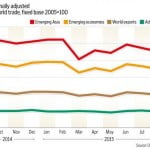
On the eve of the winter session, Prime Minister Narendra Modi on Wednesday reached out to opposition parties seeking their support to run Parliament smoothly, informing them in a rare move that he has asked the environment minister to brief them about what India’s stand is going to be at Paris climate change summit and that finance minister Arun Jaitley would hold discussions with them on the Goods and Services Tax Bill. The government also made it clear that it was agreeable for a discussion on the issue of “growing intolerance” but ruled out any House resolution condemning incidents of intolerance.
Although the all-party meeting convened by the government — which Modi joined towards the end and which was attended by top leaders of the Opposition — was a “cordial” affair, knives will be out on the first day itself as the Congress and many of the opposition parties including the Left and JD(U) are gearing up to corner the government utilising the discussion on commitment to the Constitution to mark the 125th birth anniversary of BR Ambedkar.
In some relief for the government, the Congress, however, does not appear to be supporting the demand of the Left parties that Parliament should pass a resolution condemning the acts of intolerance. The Congress want a discussion and a reply from the prime minister on the issue.
As far as the GST Bill is concerned, the Congress said it was all for it and declared its willingness to talk to the government.
Parliamentary affairs minister Venkaiah Naidu said Arun Jaitley would speak to the Congress and other parties in the next couple of days to find a breakthrough. The Congress, significantly, has brought down its list of demands from eight to three. The Congress is in a spot as it cannot be seen as blocking a reform legislation that it had authored and at the same time climb down from its demands.
It wanted eight changes earlier and sources on Wednesday said the non-negotiables could be three — it wants an 18% cap on tax to be charged, scrapping of the proposal to levy an additional 1% tax and wants formation of a GST Disputes Settlement Authority specified in the Bill. “The Bill cannot be cannot be lopsided. It should be in the interest of all the three — industry, trade and consumers. The government will have to address our genuine and legitimate concerns,” Azad said.
Speaking to a TV channel, former finance minister P Chidambaram said that given the promise to give 100% compensation to states (for any revenue loss during the initial five years after GST is introduced), the rationale for the 1% extra tax no longer existed. (The Rajya Sabha select panel has recommended 100% compensation for five years and the government is believed to be ready to accept the proposal). The government had proposed the 1% tax as it was felt that the GST being a destination-based on consumption, it could boost the revenue of consumption states and hit the “manufacturing” states.
Modi asked all parties to “join together to have a fruitful and meaningful Parliament session as the people of the country are looking to Parliament for important legislations which will better their conditions”. Naidu said the “spirit of suggestions and discussions gave me certain hope that winter session will be productive”.
The winter session, which ends on December 23, will have 38 legislative items including seven new Bills for introduction during its 20 sittings spread across 28 days. The government treats 24 of these items as under the priority category, which include GST Bill, three Bills related to replacement of ordinances and the Real Estate Regulation Bill.




